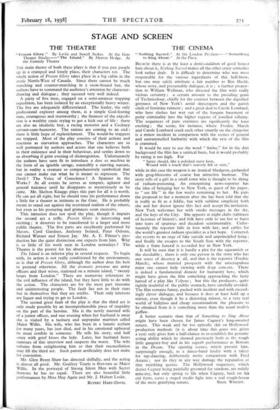STAGE AND SCREEN
THE THEATRE
"Frozen Glory." By Leslie and Sewell Stokes. At the Gate Theatre Studio—"The Island." By Merton Hedge. At the Comedy Theatre
TIM main theme of both these plays is that if you pen people up in a cramped and lonely place, their characters rot. The whole action of Frozen Glory takes place in a log cabin in the arctic North-West of Canada. Since there cannot be much marching and counter-marching in a snow-bound hut, the authors have to command the audience's attention by character- drawing and dialogue ; they succeed very well indeed.
A party of five men, engaged on a semi-amateur trapping expedition, has been isolated by an exceptionally heavy winter. The five are adequately differentiated. The leader, the only professional explorer among them, is a simple God-fearing man, courageous and trustworthy ; the fmancer of the expedi- tion is a wealthy cynic trying to get a kick out of life : there are also an idealistic boy, a racing motorist and a Cockney servant-cum-humorist. The rations are coming to an end : there is little hope of replenishment. The would-be trappers are trapped. Most of the play consists of their actions and reactions as starvation approaches. The characters are so well portrayed by authors and actors that one believes both in their existence and in their behaviour, and settles down to an absorbing if grim evening of disintegration. Unfortunately the authors have seen fit to introduce a deus ex machina in the form of an ignoble savage, ostensibly a starving outcast, but in reality a creature so comprehensively symbolical that one cannot make out what he is meant to represent. The Devil ? The Voice of Conscience ? A Spanner in the Works ? At all events he serves as tempter, agitator and general nuisance until he disappears as mysteriously as he came. Mr. Skelton Knaggs plays this part for all it is worth. He can act all right, but he should tone his performance down a little for a theatre as intimate as the Gate. He is probably meant to stand out against the restrained realism of the others, but even so his posturing and grimaces seem excessive.
This intrusion does not spoil the play, though it impairs the - second act a trifle. Frozen Glory is interesting and exciting ; it deserves to be transferred to a larger and more public theatre. The five parts are excellently performed by Messrs. Cyril Gardner, Anthony Ireland, Peter Osborn, Richard Warner and Ernest Jay. Mr. A. E. Filmer's pro- duction has the quiet distinction one expects from him. Why is so little of his work seen in London nowadays ? The Theatre is the poorer for his absence.
The Island is an inferior play in several respects. To begin with, its action is not really conditioned by the environment, as is that of Frozen Glory, although the author does his belt to pretend otherwise. All the dramatis personae are army officers and their wives, stationed on a minute island, "twenty hows from London." There are numerous references to the evil influence of the island, but they have little to do with the action. The characters are for the most part tiresome and uninteresting people. • The fault lies not in their stars but in themselves thai they are misfits. Their only interests are liquor and trying to get to London.
The second great fault of the play is that the third act is only made possible by an incomprehensible piece of stupidity on the part of the heroine. She is the newly married wife of a junior officer, and one evening when her husband is away she is visited by a taciturn and unpopular martinet called Major Willis. His wife, who has been in a lunatic asylum for many years, has just died, and in his emotional upheaval he must confide in someone. He tells his story, and half crazy with grief kisses the lady. Later, her husband hears rumours of this interview and suspects the worst. The wife refrains from enlightening him so that their reconciliation may fill the third act. Such patent artificiality does not make for conviction.
Mr. Glen Byam Shaw has directed skilfully, and the acting is almost all good. Mr. Godfrey Tearle is first-rate as Major Willis. In the portrayal of Strong Silent Men with Secret Sorrows he has no equal. There are also beautiful little performances by Miss May Agate and Mr. J. Hubert Leslie.
RUPERT HART-DAVIS.










































 Previous page
Previous page